Karma Zen Capitalism
BOB ABERNETHY, anchor: A story now about business executives and would-be executives who want to be not only rich and powerful, but happy too. That desire, as Lucky Severson reports, has created a demand for teachers of Hindu and Buddhist self-improvement techniques.
Professor SRIKUMAR RAO (“Creativity and Personal Mastery,” Columbia Business School, to class): I would like you to give me a list of things that you need to get in order to be happy.
LUCKY SEVERSON: The answer to Professor Srikumar Rao’s question would seem obvious. These are, after all, MBA students at Columbia University Graduate School of Business. Some already have their Master of Business Administration degrees and are working on Wall Street or in corporate America.
UNIDENTIFIED FEMALE STUDENT #1: Laughter and strong support structure.
UNIDENTIFIED FEMALE STUDENT #2: I need hugs and sunshine.
Prof. RAO (to class): None of this is necessary for you to be happy. None of it. Most of us function under the model we have to get something in order to do something, in order to be something. If this happens then I will be happy. And I’m suggesting to you that we live our entire lives based on that model, and that model is fundamentally flawed.
SEVERSON: The answer, says Professor Rao, is that you can’t get happiness. It’s something inside you.
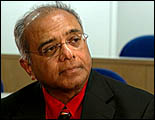 Prof. RAO: I don’t think you need to get anything in order to be happy.
Prof. RAO: I don’t think you need to get anything in order to be happy.
SEVERSON (to Prof. Rao): So that’s the answer?
Prof. RAO: Oh absolutely. Anything you can get you can lose.
SEVERSON: Imagine discussing happiness in a business course 25 years ago when some were proclaiming greed was good. Professor Rao was a player during that high flying era, a marketing consultant to several blue chip companies.
Prof. RAO: I reached a point where I said there has to be something more.
SEVERSON: When he found his answer in the teachings of Hinduism, he created a course called “Creativity and Personal Mastery.” It’s an extremely popular course with five times more applicants than can be accepted.
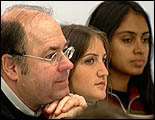 Prof. RAO: Probably 90 percent or more of my students have already been out in the business world. They have worked for some of the largest corporations in the country, and they say, “This is nice, there’s a lot of money, there’s a lot of prestige” — quote, unquote — “there’s career success, but there is something more that I’m looking for. I’m looking for fulfillment and I haven’t found it yet.”
Prof. RAO: Probably 90 percent or more of my students have already been out in the business world. They have worked for some of the largest corporations in the country, and they say, “This is nice, there’s a lot of money, there’s a lot of prestige” — quote, unquote — “there’s career success, but there is something more that I’m looking for. I’m looking for fulfillment and I haven’t found it yet.”
SEVERSON: His is not the only course offering Eastern philosophy as a road map to personal fulfillment. Professors at the top six business schools are blending Hinduism and Buddhism into their classes.
Prof. RAO: One of the core concepts of the [Bhagavad] Gita, which is a very important scripture in Hinduism, is the notion that you have some control over your actions, but you have no control over the outcome. So if you make your happiness contingent upon a particular outcome, it may or may not happen. It frequently doesn’t happen, and therefore you condemn yourself to living perpetually in frustration.
SEVERSON: The class is so popular that would-be students are willing to go through Professor Rao’s grueling acceptance process and pay an extra thousand dollars tuition fee. They get no course credit, huge writing assignments, a 62-page syllabus, and the class meets all day on Sundays. The course is so well-liked graduates even formed an alumni association. Stewart Glickman is a teaching assistant.
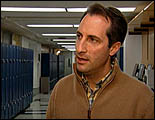 STEWART GLICKMAN (Teaching Assistant, “Creativity and Personal Mastery”): I took the course last year, and it really made an impact on me. It just made me a better husband, a better dad. It made me a better person at work just to be more sensitive to people and really understand me better.
STEWART GLICKMAN (Teaching Assistant, “Creativity and Personal Mastery”): I took the course last year, and it really made an impact on me. It just made me a better husband, a better dad. It made me a better person at work just to be more sensitive to people and really understand me better.
SEVERSON: The professor emphasizes the value of expressing gratitude and appreciation.
Prof. RAO: Whenever you’re feeling grateful, you are not feeling frustrated and angry and all those negative states that we go into. And that’s a big benefit in and of itself.
SEVERSON: Ainsley Hines is an MBA student.
 AINSLEY HINES (Student, “Creativity and Personal Mastery”): It has had immense impact on me in so many different sort of realms. Personally, it’s reinforced a lot of what my parents taught me as a young person, but which I never believed.
AINSLEY HINES (Student, “Creativity and Personal Mastery”): It has had immense impact on me in so many different sort of realms. Personally, it’s reinforced a lot of what my parents taught me as a young person, but which I never believed.
SEVERSON: If you’re a CEO and immediate happiness and fulfillment are your goals, Marshall Goldsmith is your man, providing you can afford him.
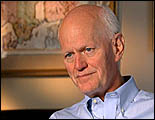 MARSHALL GOLDSMITH (Executive Coach, speaking to U.S. Chamber of Commerce group): Everybody I work with is megasuccessful, yet they want to get better. The behavior that led to the success they have is not necessarily the same behavior that’s going to lead them to get better.
MARSHALL GOLDSMITH (Executive Coach, speaking to U.S. Chamber of Commerce group): Everybody I work with is megasuccessful, yet they want to get better. The behavior that led to the success they have is not necessarily the same behavior that’s going to lead them to get better.
(Clapping) Go! Go, go, go, go, go.
SEVERSON: His job description is “executive coach” and he’s earned almost nine million frequent flyer miles traveling and speaking mostly to executives and CEOs of major corporations. Goldsmith’s mantra is “be happy now.”
Mr. GOLDSMITH: When I work with my clients I say now everything else is what’s called “feedforward,” not feedback. “Feedforward” is a very Buddhist concept. We’re not going to talk about the past. The past is over. Basic Buddhist philosophy: Every time I take a breath, it’s a new me. I believe people can change.
SEVERSON: His fees are said to be substantial, but they come with a money-back satisfaction guarantee.
(to Mr. Goldsmith): Do you help make them a better corporate citizen?
Mr. GOLDSMITH: I think I help make them a better human being. A lot of people have the right values. Their behavior doesn’t match their values. I just try to help their behavior match their values.
SEVERSON: He gathers feedback from the executive’s family and employees and then coaches his powerful clients to lead by example, to listen to those around them, how to apologize and be a decent person.
Mr. GOLDSMITH (to class): Take a deeper breath. I want you to imagine you are 95 years old. You’re just getting ready to die.
Mr. GOLDSMITH: I tell all my clients you may think your employees like you when you are 95 years old. Look around your deathbed. Ain’t no employees waving goodbye. You realize that friends and family matter. And the other one is if you have a dream, go for it.
SEVERSON: From the classrooms to the executive suite to private homes, like this one in Upper Saddle River, New Jersey, you will find people in the financial world searching for some sort of spiritual grounding. In the basement of this home of a Wall Street executive we found Gautam Jain, an instructor of an ancient Hindu philosophy known as Vedanta, which offers a life strategy to improve productivity, reduce stress, and find true happiness.
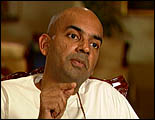 GAUTAM JAIN (Vedanta Instructor): Today’s concept of enjoyment is getting away from work. Now what Vedanta is all about it transferring your happiness to work. If you can’t find happiness in your work, you’ll never find it.
GAUTAM JAIN (Vedanta Instructor): Today’s concept of enjoyment is getting away from work. Now what Vedanta is all about it transferring your happiness to work. If you can’t find happiness in your work, you’ll never find it.
SEVERSON: Most of those attending this little gathering are successful business executives and other professionals.
Mr. JAIN (to class): Do you have a control over your mind’s obsession for success? That determines, first of all, whether you will be peaceful, second of all, whether you will be successful.
SEVERSON: Dr. Sharad Wagle is a psychiatrist who has been practicing for 32 years. He says Vedanta has enhanced his work.
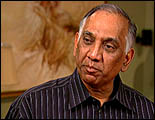 Dr. SHARAD WAGLE (Psychiatrist): A patient that had been with me for a number of years now asked me — reached in her pocketbook, took out some paper and asked me if she could borrow a pen. And she started taking notes. And I said, “What are you doing?” And she said “What you’re saying now makes more sense than anything you’ve said to me in the past two years.”
Dr. SHARAD WAGLE (Psychiatrist): A patient that had been with me for a number of years now asked me — reached in her pocketbook, took out some paper and asked me if she could borrow a pen. And she started taking notes. And I said, “What are you doing?” And she said “What you’re saying now makes more sense than anything you’ve said to me in the past two years.”
Mr. JAIN: Vedanta is not against possessions. It is against possessiveness towards your possessions. It is the attachment to your possessions that destroys you.
SEVERSON: Jonathan Lewis runs a home mortgage company in Fairfield, New Jersey.
JONATHAN LEWIS (Allied Home Mortgage): I can tell you that a number of very, very wealthy people back in 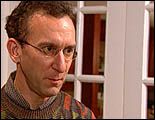 the early ’80s and late ’70s who had tens and hundreds of millions of dollars, and they were seeing psychiatrists, drinking and had problems with suicide and other things. So I don’t think money or bonuses make one happy.
the early ’80s and late ’70s who had tens and hundreds of millions of dollars, and they were seeing psychiatrists, drinking and had problems with suicide and other things. So I don’t think money or bonuses make one happy.
SEVERSON: Some of his employees might disagree with the money and bonus part, but Lewis says since he’s learned to serve others through the teachings of Vedanta, he’s convinced he’s a better boss.
Mr. LEWIS: I want to improve my life and help people around me as best I can. In order to do that I need to understand and learn to deal with more complex issues and help employees who are stressed and myself as well.
SEVERSON: The host of this class, Sanjiv Sobti, offers a word of caution from someone on the front lines of corporate America.
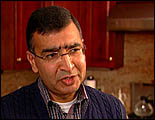 SANJIV SOBTI (Investment Banker): Regrettably, I think greed is still very much alive and well. And I think people are continuing to fill – try to fill the lacuna that they feel in their lives with material wealth.
SANJIV SOBTI (Investment Banker): Regrettably, I think greed is still very much alive and well. And I think people are continuing to fill – try to fill the lacuna that they feel in their lives with material wealth.
EVAN GALBRAITH: Living your life day-to-day and just doing your best can have enormous repercussions in areas we just don’t understand. So, you know,we can all make a difference.
SEVERSON: On that point, the student and the master agree.
Prof. RAO: MBA students at top business schools are going to reach positions of power in a relatively short time, and then their actions are going to have a tremendous impact on tens of thousands of persons in, you know, many, many, many different countries. So it’s particularly important that they reexamine their values and notions of what makes the world work.
SEVERSON: And now the world can wait and see if this philosophy of corporate responsibility and personal fulfillment actually trickles down.
For RELIGION & ETHICS NEWSWEEKLY, I’m Lucky Severson in Washington.






